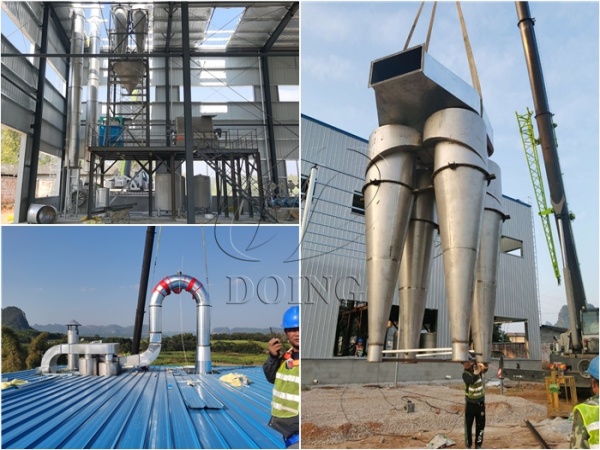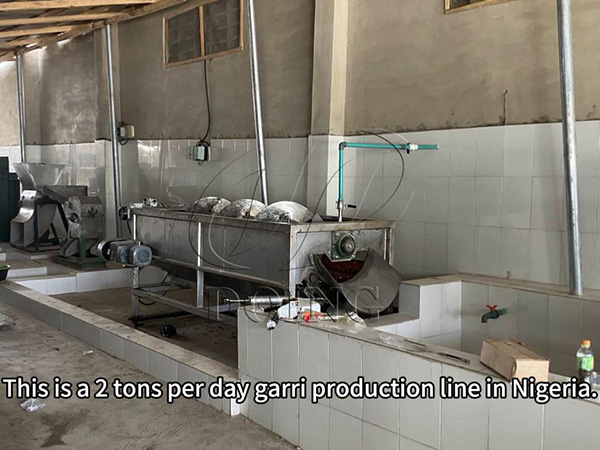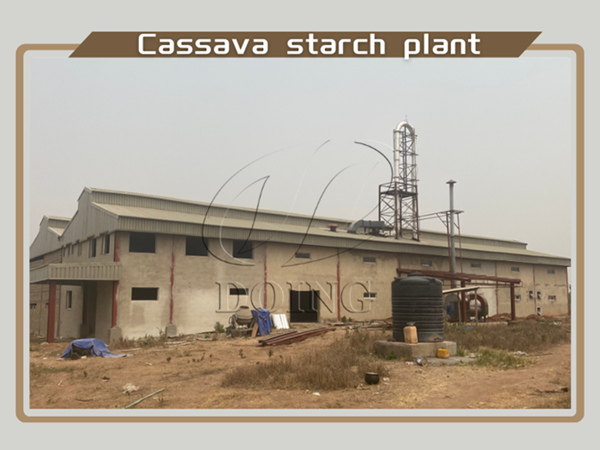
Technical Process of Attieke Production in Côte d'Ivoire
FAQ/ Chat online/ Leave a message/ July 4, 2025
Attieke, made from fermented cassava roots, is a popular traditional food in Côte d'Ivoire. Recently, we have received many inquiries about the attieke production line from the customer in Côte d'Ivoire. Today, Henan Jinrui, as the professional cassava processing equipment supplier, will introduce the complete attieke production process and the processing equipment will be used.
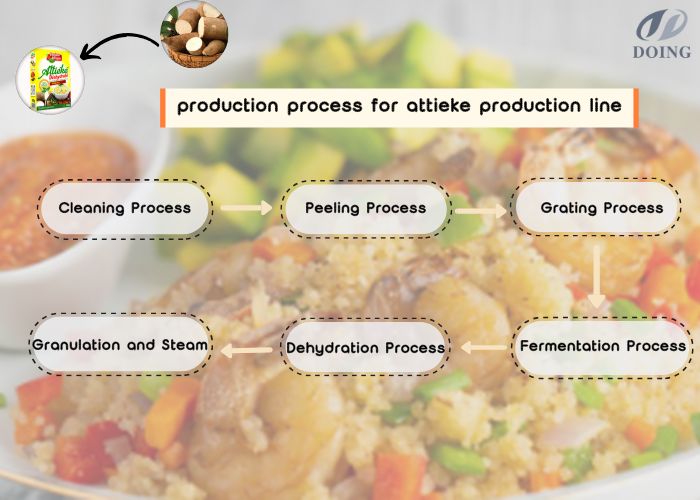 Attieke production process
Attieke production process
The attieke production process begins with cassava cleaning and washing, the cassava harvested need to be cleaned and washed to remove the mud and dirt attached on the cassava skin. The dry sieve and paddle washer is the common cassava cleaning equipment for attieke production. Henan Jinrui cassava cleaning equipment can complete a large amount of cassava cleaning in a short time, while achieving a 95% cassava cleaning rate with the lowest cassava loss rate.
Cassava peeling is the important technical process of attieke production. Because the cassava skin is toxic and will affect the quality of attieke production, it is very necessary to peel the attieke after washing. Choosing efficient peeling equipment can improve the attieke production efficiency. The peeling machine of Henan Jinrui is the first choice of many attieke processors in Côte d'Ivoire, which uses sand rollers to peel, and the peeling rate can reach more than 90%.
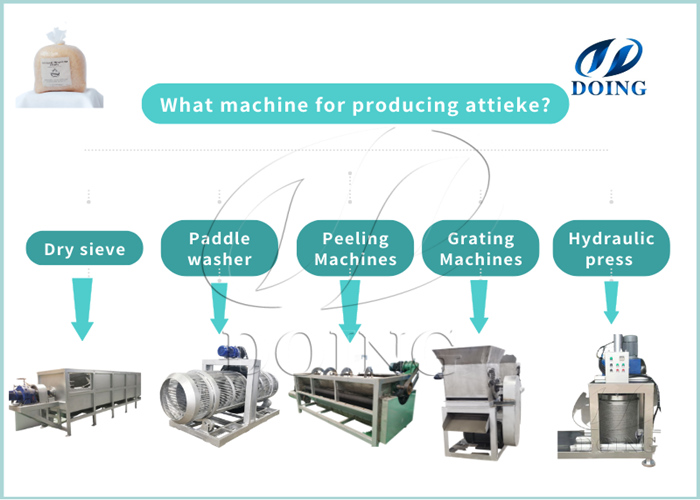 Attieke production line
Attieke production line
The peeled cassava needs to be crushed to facilitate the subsequent fermentation process of attieke. The traditional manual grinding is too inefficient and unhygienic. Henan Jinrui's cassava grinding machine has received many inquiries from customers in Côte d'Ivoire due to its excellent grinding effect, 80% crushing rate is beneficial for attieke fermentation.
Fermentation is a crucial technical process for attieke production. During this process, the cassava pulp is allowed to ferment, which helps in breaking down the hydrocyanic acid naturally found in cassava. This step not only enhances the attieke flavor but also makes the cassava safer for consumption.
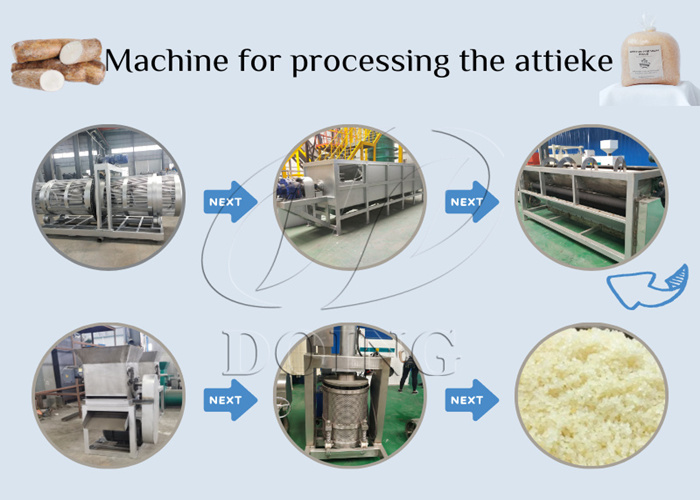 Cassava processing machine for attieke production
Cassava processing machine for attieke production
After fermentation, the cassava pulp is transferred to the dehydration equipment to remove excess liquid. This step is typically done using a mechanical press, attieke processors in Côte d'Ivoire commonly select the hydraulic press designed by Henan Jinrui for dewatering, the moisture content of cassava mush processed reach 35%-40%, which is beneficial for the subsequent attieke production process.
After pressing, the cassava cake needs to enter the crushing stage to form smaller particles for subsequent attieke processing. In the traditional attieke granulation process in Côte d'Ivoire, people use special tools to break the cassava cake, and then obtain uniform particles by kneading and sieving. However, manual granulation requires skills and experience, and the attieke quality cannot be guaranteed. Therefore, mechanical granulation systems are widely used in attieke production, usually consisting of a crusher, a granulator and a sieving machine, which can better control the attieke particle size, reduce the proportion of oversized particles and fine powder, and obtain ideal traditional attieke particles with a particle size range of 0.5-2mm.
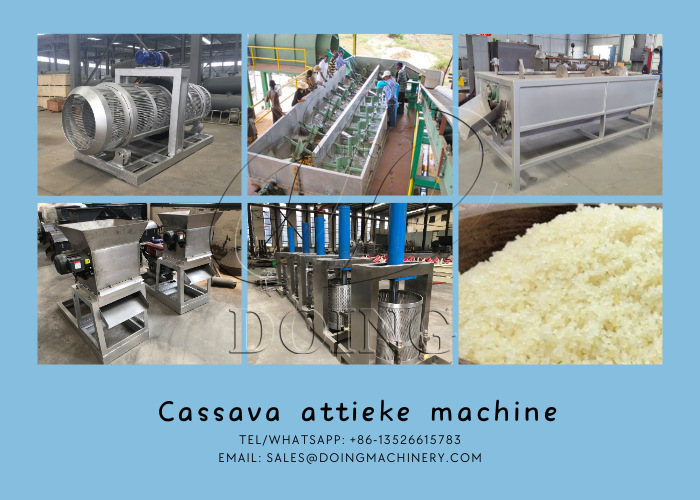 Attieke processing machines
Attieke processing machines
After granulation, entering the final step of the attieke production process, drying and steaming. The attieke particles are dried by natural sun light or drying equipment. The dried attieke particles are then steamed for about 25 to 35 minutes, depending on the production unit. Steaming not only helps the attieke to be fully cooked, making it soft and delicious for easy consumption, but also further enhances the flavor of the attieke.
The technical process of attieke production in Côte d'Ivoire is a combination of traditional methods and modern techniques that ensure the production of a high-quality, safe, and flavorful food product. Each step, from the cassava preparation to the final steaming process, plays a crucial role in achieving the desired characteristics of attieke. The process is deeply rooted in the cultural heritage of Côte d'Ivoire and continues to be an important part of the local culinary tradition. If you also want to begin the attieke production in Côte d'Ivoire, welcome to contact Henan Jinrui! We will provide you with the professional technology suggestion and high quality attieke processing equipment!
Leave A Message
- Do you want to buy machine?
- Yes, I want to buy machine
- No, I want to learn more in advance.
- What is your raw material?
- Cassava
- Potato
- Sweet potato
- Other:
- What is the final product you want to produce?
- Chips
- Flour
- Starch
- What is the final product you want to produce?
- Garri
- Cassava flour
- Cassava starch
- Cassava chips
- Attiekie
- Bammy
- Other:
- What is your planned capacity for final product?
- <1 ton per day
- 1 ton per day
- 2 tons per day
- 3 tons per day
- 3-10 tons per da
- 10-20 tons per day
- >20 tons per day
- What is the usage of your cassava chips?
- Food usage (like fried chips, flour)
- Industrial usage (like animal feeds, ethanol)
- What is your planned capacity for final product?
- <5 ton per hour
- 5-10 tons per hour
- >10 tons per hour
- What is your planned capacity for final product?
- <500 kg per hour
- 0.5-5 ton per hour
- 5-10 ton per hour
- >10 ton per hour
- What is your planned capacity for final product?
- <300 kg per hour
- 300-1000 kg per hour
- 1-5 ton per hour
- 5-10 ton per hour
- >10 ton per hour

